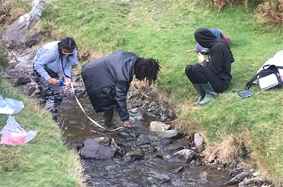“I really enjoyed the lessons on Global Fashion – I hadn’t really thought about where my clothes were made and what conditions people had to work in to make them but now I do.”
“We were given a challenge to present the layers of a rainforest, but in 3D in a shoebox! It was so fun to make and I enjoyed seeing what everyone else had made. I could easily learn about how the climate and animals work together in this ecosystem.”
“I loved our Year 10 fieldtrip to Carding Mill Valley - it was so much fun getting into the river in our wellies to record the speed of the river and the size of the sediments.”
We are very proud in Geography of the way we embed our School’s Intent, particularly through:
- Exploring the world around us by fostering our interdependence whilst promoting social cohesion;
- Enabling our students to be global citizens that are aware of world events allowing them to evaluate the impact they have on our dynamic world;
- Providing a balanced and sustainable curriculum where all learners illustrate knowledge, apply understanding and embed geographical skills at all key stages.
These are shown through the range of activities on offer, where independent and collaborative learning are the norm. There is a focus on use of precise and technical language in each lesson. We explore a range human and physical Geography, as well as emphasising the interconnected nature of our subject.
Key Stage 3
Our aims align with the National Curriculum:
- to develop contextual knowledge of the location of globally significant places – both terrestrial and marine – including their defining physical and human characteristics and how these provide a geographical context for understanding the actions of processes
- to understand the processes that give rise to key physical and human geographical features of the world, how these are interdependent and how they bring about spatial variation and change over time
and to ensure that students have the geographical skills needed to:
- collect, analyse, and communicate with a range of data gathered through experiences of fieldwork that deepen their understanding of geographical processes
- interpret a range of sources of geographical information, including maps, diagrams, globes, aerial photographs, and Geographical Information Systems (GIS)
- communicate geographical information in a variety of ways, including through maps, numerical and quantitative skills and writing at length.
From Year 7, students develop the geographical skills required to embed knowledge and apply understanding to interspersed human and physical topics throughout Key Stage 3. They explore Geography at a range of scales, comparing the physical and human domains of geography through topics such as flooding, Antarctica, Development and Ghana. These are supported by other foci such as global fashion, climate change and topical Geography which explore the social, economic, environmental and political aspects, providing opportunities to question and challenge the complexities of our modern world.
Be the end of year 9, our students will be expert learners with increased skills in evaluation. They will have embedded geographical skills, such as the interpretation of graphs and maps at a range of scales. Students will be inspired to ‘think like a geographer’ and will continue to enrich their knowledge and environmental understanding of geography.
The Key Stage 3 Geography Curriculum Plan can be found at the bottom of this page.
Key Stage 4
Students follow the AQA GCSE Geography Specification (8035). AQA | Geography | GCSE | Geography
There are three written examinations completed at the end of year 11, focusing on physical geography, human geography and geographical skills: including fieldwork.
- Living with the Physical Environment - written exam - 1 hour 30 minutes - 35% of GCSE
- Challenges in the Human Environment - written exam - 1 hour 30 minutes - 35% of GCSE
- Geographical Applications - written exam based on pre-release booklet and applying fieldwork skills to questions- 1 hour 30 minutes - 30% of GCSE
The Key Stage 4 Geography Curriculum Plan can be found at the bottom of this page.
Enrichment Opportunities
There are a number of opportunities for cultural capital to be explored. These include local field study activities in key stage 3, as well as a trip to Woburn Safari Park for year 7. Students investigate on disaster management and decision-making, leading to fluvial field trips to Carding Mill Valley for GCSE students and exploring the Changing Places of Brick Lane and Stratford with A level students. This is supplemented by an A Level residential trip to Castlehead in the Lake District. There is an enrichment opportunity for KS4 and 5 students to Naples. There is a Geography Society lead by Sixth Form students expanding general knowledge of geographical phenomena. This is supplemented by exam and revision webinars.
Head of Geography - Mrs T Harvey

